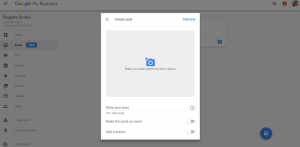Part 1 – Creating an Inbound Marketing Plan
Let’s say you want to start your own business.
We’re big baked goods fans here at IQnection, so we’ll use cookies as an example. And in this illustration, you make really superb cookies. They’re so good in fact that when people taste these cookies, they say “You could SELL these.”
So that’s what you decide to do. And even though everyone loves cookies, the same rules of getting your business to grow still apply. That’s why we’ve put together this guidebook for entrepreneurs. In later installments, we’ll discuss sales and business development, but we’ll start with creating a marketing strategy for your business.

How To Write A Marketing Plan
Start your marketing plan with a summary. Explain what your business is about, your primary goals, and how you plan on reaching those goals.
But you should write this summary last, so that you can check to make sure everything makes sense, and that you haven’t missed any key points.
Study your strengths and weaknesses. In our example, your strengths may be your quality of your product – the delicious cookies – and the fact that you have little overhead. Your weaknesses might be, say, a crowded marketplace or limited resources.
Conducting a SWOT analysis – Strengths, Weaknesses, Opportunities, Threats – can help you identify new customers, new ways to reach them, and new opportunities to help finance your business.
Coming Up With SMART Objectives
We’ve talked here before about the concept of SMART goals for your inbound marketing efforts. It doesn’t just mean “well thought out” (although they should be that too). We’re using SMART as an acronym:
- SPECIFIC – You shouldn’t just say, “We want new customers.” Rather, put a number on your goal: “We want to get 20 new customers.”
- MEASURABLE – Whatever goal you have, you need to be able to gauge whether you’re close to reaching it.
- ATTAINABLE – Some marketing websites use “achievable,” but it’s a tomato/to-mah-to kind of difference. The point is that you’re choosing something that’s challenging, but still possible.
- RELEVANT – Again, there are some lists that make the R in SMART stand for “realistic,” but we can’t see how that differs from “attainable.” So we think a more useful question to ask is this: “Is this goal relevant to my overall vision for the company?”
- TIME–BOUND – Your objective should come with a deadline. “20 new customers in 20 months.”
Planning For Growth
There are basic principles to effectively execute your marketing strategy.
- Listen to your customers. In fact, you may want to get feedback even before you launch your product. Find out their likes and dislikes, and look for ways to solve their problems.
- Create great content. It’s the foundation of inbound marketing. Creating quality content drives traffic to your business’ website and helps establish you as an expert in your field. It costs little to create, and – unlike traditional outbound marketing tactics – is space that you own. Start by addressing the problems your prospects and future customer have.
- Connect on social media. Whether you’re on Twitter, Facebook, or LinkedIn, your social media platforms allow you to continue the conversations you began when you created content for your website. You can share what you’ve created, and engage with fans of your company. Your fans may share your information and in turn grow your follower base.
- Track the success of your inbound marketing efforts. With this quantifiable information in hand, you should adjust your tactics and focus on doing those things that are delivering the biggest returns.
If this seems like a lot to take on while also worrying about launching a business, don’t worry. You don’t need to go it alone. IQnection can help you launch a marketing strategy that finds your ideal customers. We’ve spent more than 16 years building great websites for our customers, but also working with them to create amazing content that can turn your prospects into customers.
Business & Finance Articles on Business 2 Community(89)
Report Post








